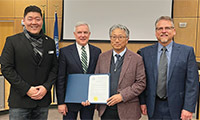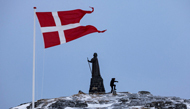An initial euphoria after the end of
the Bush era gives way to a trans-
Atlantic ‘spiral of dissatisfaction’ . . .
Morocco THE ELECTION OF Barack Obama as president of the United States seemed to most Europeans to be unadulterated good news, marking an end to the perceived unilateralism and indifference to allied views of former President George W. Bush.
But nine months into Mr. Obama’s presidency, trans- Atlantic relations are again clouded by doubts. Europe and the United States remain at least partly out of sync on Afghanistan, the Middle East, Iran and climate change.
Many Europeans argue that Mr. Obama has not broken clearly enough with Bush administration policies that they dislike, while some Americans argue that the Europeans are too passive, watching
Mr. Obama struggle with difficult issues, like Afghanistan and the detention center at Guantanamo Bay, without providing much substantive help. Mr. Obama remains popular with the European public, but a senior European official said that he was worried about an underlying disaffection. “It’s dangerous, because we must not get into a spiral of dissatisfaction on both sides,” he said. These generalizations lack real substance, he said, but the criticism runs that “the U.S. thinks that Europeans don’t want to do anything to help and the Europeans feel that the U.S. is naive and not delivering enough.”
Another senior European official said that for “all the talk of multilateralism” and the European contribution of aid and NATO troops to the fight against the Taliban, which has brought more than 500 European deaths, Afghanistan remained an American show. “Europeans are sitting around waiting for Washington to decide what the Afghanistan policy is going to be,” he said.
Frustration Is Felt
On Both Sides of Atlantic
On Iran, Europeans, and especially the French, are concerned that Mr. Obama could sacrifice the principle of preventing Tehran from enriching uranium-as demanded by the United Nations Security Council-to get what seems like an agreement for broad talks with Iran on regional and bilateral issues.
President Nicolas Sarkozy of France went so far as to chide Mr. Obama in public at the United Nations General Assembly in September, saying: “I support America’s outstretched hand. But what has the international community gained from these offers of dialogue? Nothing but more enriched uranium and centrifuges.”
A lot of the problem is the fault of the Europeans themselves, said Hubert Vedrine, a former French foreign minister. “Europe for Obama is not a priority, not a problem and not a solution for his problems,” he said in an interview here. “Obama keeps a distance and has a kind of hauteur” with European leaders, Mr. Vedrine said. “But that’s not a sufficient reason for Europeans to act like spectators” as Mr. Obama tries to cope with his challenges. “I think it’s necessary to help him,” he said.
European nations have been slow to help Mr. Obama with the major points on his agenda. They have so far agreed to take only a handful of detainees from the Guantanamo detention center, which Mr. Obama vowed to close within a year. And European countries that belong to NATO have also been slow to provide Mr. Obama much extra help in Afghanistan, in part because many Europeans strongly oppose the war and Washington has not yet agreed upon a compelling new strategy to succeed in Afghanistan.
Jean-David Levitte, Mr. Sarkozy’s diplomatic counselor and former ambassador to the United States, said that Europe nonetheless remained Washington’s best ally. Mr. Obama’s election was enthralling to Europeans, he said, “transforming the image of the United States in just several months.” He said, “We all feel a stake in the U.S.”
Is Europe ready to respond? “Of course it is,” he said, citing more than 35,000 European troops now in Afghanistan. “If not the Europeans, who would there be? No one else.” In a recent report, the European Council on Foreign Relations, an independent research group, urged European Union governments to shake off illusions about the trans- Atlantic relationship if they wanted to avoid global irrelevance.
The report, written by the council’s Nick Witney and Jeremy Shapiro of the Brookings Institution after interviews in all 27 members of the bloc, argues that Europeans retain key and damaging “illusions” they acquired over “decades of American hegemony,” which produces “an unhealthy mix of complacency and excessive deference” to a United States that has a “rapidly decreasing interest” in a Europe that cannot pull its own weight.
The United States “needs strong partners in a world it no longer dominates,” the authors say, and while it would prefer a more united European Union , Washington no longer expects to see it.
While Mr. Obama is personally sympathetic and even “European” in his policy choices, the report argues, “Europeans miss the implications of the self-avowed pragmatism” of his administration, which wants “to work with whoever will most effectively help it achieve the outcomes it desires.”
스마터리빙
more [ 건강]
[ 건강]이제 혈관 건강도 챙기자!
[현대해운]우리 눈에 보이지 않기 때문에 혈관 건강을 챙기는 것은 결코 쉽지 않은데요. 여러분은 혈관 건강을 유지하기 위해 어떤 노력을 하시나요?
 [ 건강]
[ 건강]내 몸이 건강해지는 과일궁합
 [ 라이프]
[ 라이프]벌레야 물럿거라! 천연 해충제 만들기
 [ 건강]
[ 건강]혈압 낮추는데 좋은 식품
[현대해운]혈관 건강은 주로 노화가 진행되면서 지켜야 할 문제라고 인식되어 왔습니다. 최근 생활 패턴과 식생활의 변화로 혈관의 노화 진행이 빨라지고
사람·사람들
more
[한인단체 신년 인터뷰] LA 평통 장병우 회장… “본연 역할로 한반도 평화 실질 기여”
민주평화통일자문회의 LA협의회(이하 LA 평통) 장병우 회장은 6일 본보와의 신년 인터뷰에서 붉은 말의 해인 병오년 새해를 맞아 신년 화두로 …

워싱턴주에 첫 한인 시의장
워싱턴주에서 첫 한인 시의회 의장이 탄생했다. 제이슨 문(한국명 문태원) 머킬티오 시의원이 새해 들어 시의장으로 선출되며 또 하나의 중책을 맡…
국회 방문단 대한인국민회 방문
윤후덕·이해식·김한규 의원과 조오섭 국회의장 비서실장 등 10여 명의 한국 국회방문단이 지난 5일 LA를 찾아 로즈데일 묘지와 국민회관 등 미…
[한인단체 신년 인터뷰] 명원식 파바월드 회장… …
“한인 차세대들이 바르게 자랄 수 있는 토대를 만드는 것이 제가 파바월드의 회장으로 존재하는 유일한 이유입니다”한인사회의 대표적 청소년 봉사 …
LA한인회 멘토 프로그램 10일 스티브 강 위원장
LA 한인회(회장 로버트 안)가 한인사회 차세대 인재양성 노력의 하나로 ‘멘토를 만나다’ 프로그램을 정례화해 실시하고 있는 가운데 그 세 번째…
많이 본 기사
- 상원 베네수관련 표결서 공화 5명 반란…트럼프 “부끄러워해야”
- 머스크, 韓인구절벽 또 경고… “북한군 그냥 걸어 넘어오면 돼”
- 美각료 “美의 베네수 제재위반 배 나포 보며 北 무슨 생각할까”
- 이민단속국 총격 여성 사망에 시위 확산…충돌·긴장 고조
- 한국계 美의원들 “한국계 미국인의 유산·전통이 바로 美가치”
- 험악했던 美·콜롬비아 관계 반전…콜롬비아 “정상회담 준비”
- 빅터차 “’트럼프 관세’ 위법 판단시 한미간 더 큰 불확실성”
- 부통령 “유럽, 그린란드 관련 트럼프 진지하게 받아들여야”
- 연예계 은퇴합니다..돌연 충격 선언한 조윤우·소희·이태임
- 뉴욕증시, 시총 4조달러 눈앞에 둔 알파벳…혼조 마감
- 구글 공동창업자도 오라클 회장도…탈캘리포니아?
- 덴마크·그린란드, 美 ‘그린란드 회담’ 수락에 “환영”
- [스키 기고] 초보자의 수난과 고수의 허세
- 팰팍 타운 77만달러 적자 놓고 정치권‘충돌’
- “공업용 실리콘을 얼굴에”..故 선풍기 아줌마, 충격적인 성형 부작용[꼬꼬무]
- 시애틀~인천노선운항 항공사 1개 줄듯...국토교통부 대한항공 대체항공사로 알래스카항공 최종 결정
- 유엔, 올해 세계경제 성장률 2.7% 전망…한국은 1.8%로 예상
- ICE 요원 총격… 시민권자 여성 사… 5
- 젤렌스키 “美 우크라 안전보장안, 트럼프 결정만 남아”
- 트럼프, ‘美 베네수 운영 관여 1년 넘나’ 묻자 “훨씬 더 길 것”
- 초강경 이민단속, 아시아계도 큰 타격 3
- 내란특검, 尹 구형 숙고 6시간 ‘마라톤 회의’…키는 조은석 손에
- 트럼프 관세에 美 무역적자 16년만에 최소…의약품 수입 금감
- 탁재훈·신정환, 드디어 컨츄리꼬꼬 재회.. “또 잡힌 겁니까?”[노빠꾸]
- ‘오타니·야마모토’ 때문에 日 못 뚫는 SF, ‘이정후 파워’로 한국 개척 나선다... 일본도 주목 중
- ‘데이트 폭력 폭로’ 재키와이, 돌연 입 열었다 “흉기·스토킹 NO”
- ‘美 정복’ 손흥민, 케인·메시·음바페와 어깨 나란히... ‘올해의 팀’ 공격수 부문 후보 등극
- 컴퓨터 전공·로스쿨 졸업생들도‘취업난’극심
- 브로드웨이 뮤지컬 공연을 반값에…
- 美, ‘외국산 드론·부품 수입 금지’ 예외 허용…삼성 제품 포함
- [발언대] L.A. 갈비의 유래
- 美, 인천에 본부 둔 녹색기후기금 탈퇴… “자금지원 안해”
- 케빈 김 주한 미 대사대리 전격 이임
- 이주자 텍사스 몰린다 가주는 유입자 최하위
- [독자 투고] 땅 끝 마을 파타고니아… 2
- ICE Agent Shooting Sparks Outrage: U.S. Citizen Woman Killed
- 42억 횡령→징역형 집유 받았는데도..황정음 소속사 여전히 미등록
- 유엔기후협약, 美 탈퇴에 “자책골…재가입문 열려있어”
- 李대통령 “에너지 문제로 국제 혼란…에너지대전환 잘 준비해야”
- 마크롱 “美, 일부 동맹국에 등 돌리고 국제규범서 벗어나”
- 韓 여야, 이혜훈 청문회 19일 하루 잠정 합의… “충분히 질의”
- 軍권력기관 방첩사, 계엄 여파로 49년 만에 역사 속으로
- “모든 소송 철회하고 내분사태 원만히 해결하길”
- 치매 예방효과 탁월한 활동은 ‘춤’…… 1
- 아시아나항공, 14일부터 인천공항 제2터미널 사용
- 오렌지 상자와 함께하는 2026년
- ‘맥립’에 갈비고기 없다 맥도널드 허위광고 소송
- ‘연방 하원 민주·상원 공화’가능성 커
- 은퇴준비를 더 이상 미루면 안되는 이유
- D-SNP 한인 가입자들, 그로서리 혜택 놓친다
1/5지식톡

-
 미 육군 사관학교 West Poin…
0
미 육군 사관학교 West Poin…
0https://youtu.be/SxD8cEhNV6Q연락처:wpkapca@gmail.comJohn Choi: 714-716-6414West Point 합격증을 받으셨나요?미 육군사관학교 West Point 학부모 모…
-
 ☝️해외에서도 가능한 한국어 선생님…
0
☝️해외에서도 가능한 한국어 선생님…
0이 영상 하나면 충분합니다!♥️상담신청문의♥️☝️ 문의 폭주로 '선착순 상담'만 진행합니다.☎️ : 02-6213-9094✨카카오톡ID : @GOODEDU77 (@골뱅이 꼭 붙여주셔야합니다…
-
 테슬라 자동차 시트커버 장착
0
테슬라 자동차 시트커버 장착
0테슬라 시트커버, 사놓고 아직 못 씌우셨죠?장착이 생각보다 쉽지 않습니다.20년 경력 전문가에게 맡기세요 — 깔끔하고 딱 맞게 장착해드립니다!장착비용:앞좌석: $40뒷좌석: $60앞·뒷좌석 …
-
 식당용 부탄가스
0
식당용 부탄가스
0식당용 부탄가스 홀세일 합니다 로스앤젤레스 다운타운 픽업 가능 안녕 하세요?강아지 & 고양이 모든 애완동물 / 반려동물 식품 & 모든 애완동물/반려동물 관련 제품들 전문적으로 홀세일/취급하는 회사 입니다 100% …
-
 ACSL 국제 컴퓨터 과학 대회, …
0
ACSL 국제 컴퓨터 과학 대회, …
0웹사이트 : www.eduspot.co.kr 카카오톡 상담하기 : https://pf.kakao.com/_BEQWxb블로그 : https://blog.naver.com/eduspotmain안녕하세요, 에듀스팟입니다…
케이타운 1번가
오피니언
 이상희 UC 리버사이드 교수 인류학
이상희 UC 리버사이드 교수 인류학 오렌지 상자와 함께하는 2026년
 오세정 서울대 물리천문학부 명예교수·전 총장
오세정 서울대 물리천문학부 명예교수·전 총장 [오세정 칼럼] 병오년 새해, 한국의 과제
 존 안 / LA 거주
존 안 / LA 거주 [독자 투고] 땅 끝 마을 파타고니아 여행 유감
 이리나 수필가
이리나 수필가 [윌셔에서] 레디 코어(Ready Core)의 해를 맞으며
 이영창 / 한국일보 논설위원
이영창 / 한국일보 논설위원 [지평선] 67년생 현역 축구선수 미우라

[왈가 왈부] “이혜훈 청문회까지 지켜봐야”… 국민 눈높이에 맞나요
 정숙희 논설위원
정숙희 논설위원케네디에 관한 네 개의 이야기
 마크 A. 시쎈 / 워싱턴포스트 칼럼니스트
마크 A. 시쎈 / 워싱턴포스트 칼럼니스트 [마크 A. 시쎈 칼럼] 트럼프의 20가지 업적
 김동찬 시민참여센터 대표
김동찬 시민참여센터 대표 [미국은 지금] 2026년 ‘손님’ 의식 버리고 ‘주인’ 입장을
1/3지사별 뉴스

팰팍 타운 77만달러 적자 놓고 정치권‘충돌’
뉴저지 팰리세이즈팍 타운정부가 지난해 77만5,000달러 재정적자가 발생한 것을 두고 정치권이 강하게 충돌하면서 지역 한인사회가 술렁이고 있다…
뉴욕 등 5개주 연방아동보육예산 지원 전격 중단

‘연방 하원 민주·상원 공화’가능성 커
올해 11월3일 미 전역에서 중간선거가 실시된다. 이번 선거에서는 연방 하원 전체 435석과 함께 연방 상원 100석 가운데 35석을 새로 선…
“주택 부족, 워싱턴 경제 위험 초래”

베네수 이어 그린란드…트럼프, 2년차 벽두부터 美우선주의 거친 질주
2026년 새해 벽두부터 도널드 트럼프 대통령의 행보가 심상치 않다.집권 2기 2년차를 맞아 자신과 지지층의 이념이라 할 ‘미국 우선주의’ 구…
중부 캘리포니아 ‘한인 이민사’ 나왔다

오늘 하루 이 창 열지 않음 닫기 




















































.png)


댓글 안에 당신의 성숙함도 담아 주세요.
'오늘의 한마디'는 기사에 대하여 자신의 생각을 말하고 남의 생각을 들으며 서로 다양한 의견을 나누는 공간입니다. 그러나 간혹 불건전한 내용을 올리시는 분들이 계셔서 건전한 인터넷문화 정착을 위해 아래와 같은 운영원칙을 적용합니다.
자체 모니터링을 통해 아래에 해당하는 내용이 포함된 댓글이 발견되면 예고없이 삭제 조치를 하겠습니다.
불건전한 댓글을 올리거나, 이름에 비속어 및 상대방의 불쾌감을 주는 단어를 사용, 유명인 또는 특정 일반인을 사칭하는 경우 이용에 대한 차단 제재를 받을 수 있습니다. 차단될 경우, 일주일간 댓글을 달수 없게 됩니다.
명예훼손, 개인정보 유출, 욕설 등 법률에 위반되는 댓글은 관계 법령에 의거 민형사상 처벌을 받을 수 있으니 이용에 주의를 부탁드립니다.
Close
x